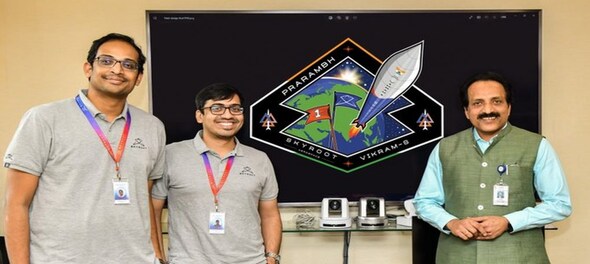
Spacetech startup Skyroot Aerospace, which holds the distinction for launching India’s first-privately built rocket, has raised $27.5 million in a pre-Series C round led by Temasek.
The Hyderabad-based startup says fresh funds will help propel its rockets towards commercial satellite launches, fuel tech innovation, attract top talent, boost launch frequency and capabilities.
Last week, Skyroot unveiled its second rocket—Vikram-1—which is scheduled for launch in early 2024. The seven-storey-tall rocket towers over its six-foot-something predecessor—Vikram-S.
The Vikram series of rockets are being tested for regular space launch services to help deploy a single or constellation of small-to-medium sized satellites across earth’s lower orbits for Skyroot’s customers.
“As a key player in India's private space industry, we are amplifying our capabilities to tap into the expanding global satellite launch market with a goal to emerge as a favorite ‘go-to’ choice in space launch services for small satellites,” said Pawan Kumar Chandana, co-founder and CEO of Skyroot Aerospace.
Founded in 2018 by two former ISRO scientists—Pawan Kumar Chandana and Naga Bharath Daka—Skyroot Aerospace is India’s most-funded spacetech startup with total funding of over $90 million since inception in 2018. The previous Series-B fundraise of $51 million was led by Singapore sovereign fund GIC in September, 2022.
In June, Pixxel—which is striving to build a “health monitor for earth” by placing constellations of hyperspectral earth-imaging technology—announced a $36 Million Series B funding round with participation from new investors such as Google. The round took Pixxel’s total funding to over $70 million.
Earlier in October, Agnikul Cosmos—a potential competitor to Skyroot—raised $26.7 million in a Series B fundraise led by Celesta Capital, Rocketship.VC and others, taking its total fundraise to over $40 million.
The capital infusion signals that India’s space tech startups have found not only the escape velocity to take off, but also raise private funding to enable their flight.
As of 2022, the Indian spacetech ecosystem—with more than 100 space startups— had raised nearly $250 million in funding, as per a report by the Indian Space Association (ISpA).
Most of the funding has come in since mid-2020 after ISRO and IN-SPACe (Indian National Space Promotion and Authorisation Centre) started encouraging spacetech startups. In August this year, The pen was put to paper as the Indian Space Policy was released, opening the gates for greater participation from private players in a sector, which had ISRO as the gatekeeper since the 1960s.
India's space sector has the potential to grow from $8.4 billion currently to $44 billion in the next decade, as per a white paper released by IN-SPACe. Startups are expected to play a key role in bringing innovation.
Skyroot’s co-founder and CEO Pawan Kumar Chandana says, “India's successful moon landing mission has reignited global interest in India's space prowess.”
Check out our in-depth Market Coverage, Business News & get real-time Stock Market Updates on CNBC-TV18. Also, Watch our channels CNBC-TV18, CNBC Awaaz and CNBC Bajar Live on-the-go!


2024 Lok Sabha Elections | Will Amethi and Rae Bareli see the rise of Priyanka Gandhi as a dominant political figure
May 18, 2024 8:59 AM
Lok Sabha Election 2024: I.N.D.I.A. bloc to hold rally at Mumbai's BKC today
May 17, 2024 5:18 PM
In Ayodhya, voters talk of a promise fulfilled and yearning for development
May 17, 2024 2:10 PM
Fight of heavyweights in Sambalpur where farmers, weavers hold the key
May 17, 2024 12:25 PM

